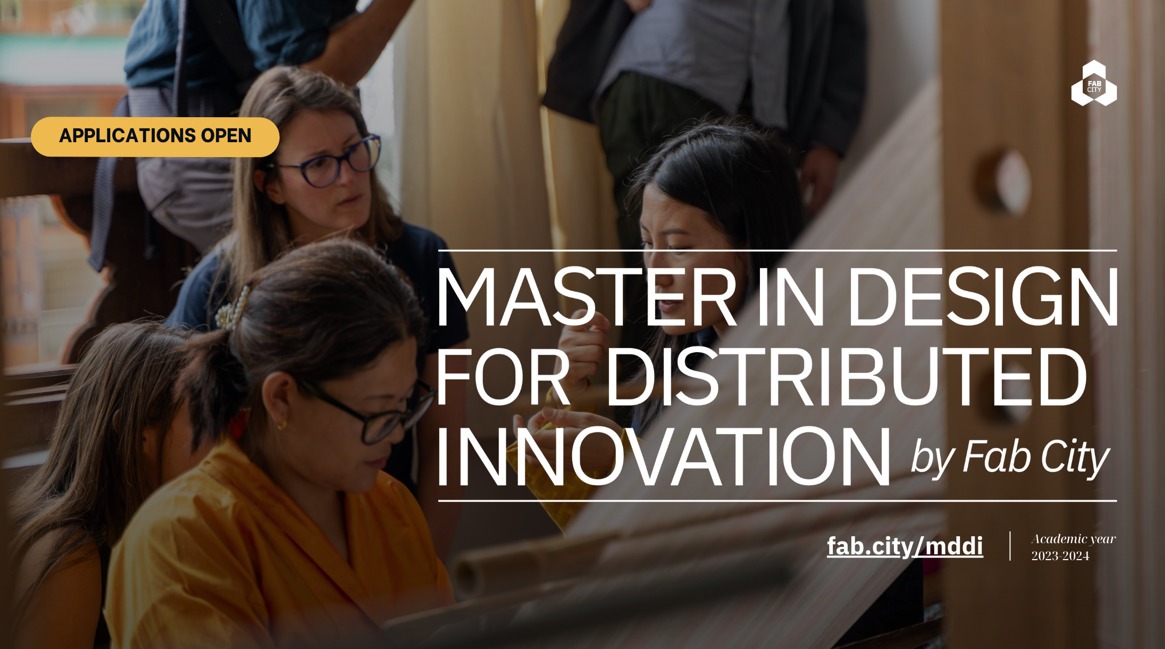Globally connected, local changemakers.
PRESENTATION
The Master in Design for Distributed Innovation (MDDI) is a distributed learning program focused on the intersection of design, technology, ecosystems and communities to improve interspecies wellbeing. MDDI is a research and innovation ecosystem for creative professionals, entrepreneurs, policymakers and agents of change who want to realize real-world responses to the climate crisis, social injustice and biodiversity loss, connecting a global community of changemakers with local innovators in order to address complex challenges.
It combines online and in-person learning to support innovators to gain the social and technical skills needed to develop projects for positive impact with their own communities that aim for measurable transformational change towards planetary consciousness.
The programme is organized by the Institute for Advanced Architecture of Catalonia and Fab City Foundation. It is co-delivered by Fab Lab Barcelona at IAAC, local nodes of the distributed campus, and is supported by the global Fab Lab Network.
A Distributed approach
To transition to a new production paradigm, design takes on a new role in the constellation of planetary crises that have been caused by our current industrial model, through which design originally became a revered discipline. Design education has been based on those colonial foundations and globalised ideals of the past. A shift is needed towards how we learn to, from and with design by imagining new processes to reconfigure the relationship between humans and the natural ecosystems around them, and methodologies and approaches rethought to learn and understand how to design from and for diverse contexts.
PROFILE OF PARTICIPANTS
As a MDDI candidate, participants might be already working in the public or private sector, academic institutions or, may come from an entrepreneurial background having started their own business related to planetary restoration. The program aims to become a platform to boost and accelerate students’ capabilities to produce change in their own contexts, and to accelerate the transition towards a productive and sustainable model of production and consumption in their communities.
Creative industries and makers
Designers, Makers, Architects, Urbanists and Artists who want to expand their knowledge by incorporating new design methodologies, technological skills and theoretical arguments to deploy in their personal and professional projects sustainably.
Entrepreneurs and social Innovators
Professionals from all areas who wish to transform their ideas into social innovations or start their sustainable entrepreneurship by expanding their technical skills and design methods to become agents of positive change.
Government employees and NGOs
Professionals who are already making changes from inside in public services or non-governmental-organisations and want to accelerate the impact of policy by adopting an innovation culture.
PROFESSIONAL OPPORTUNITIES
The program offers innovators and changemakers the opportunity to address global challenges in their working and living contexts to enable local transformation, by learning from and adapting global knowledge. MDDI graduates will have the possibility to integrate the knowledge acquired in the program in their working environments, or expand their research agenda after the program. At the same time, graduates with an existing business or initiative linked to the purpose of the program will have the opportunity to reinforce and scale up their reach, and incorporate new knowledge in their current mission.
An MDDI graduate might change or develop a new department within their organization, or find work as Head of Innovation, Director of Strategic Design, Head of Research and Development, CEO of their own startup, or lead transformation projects in public and civil organizations.
ADMISSION REQUIREMENTS
Bachelor or higher degree in Industrial Design, Product Design, Architecture and Urban Design, Graphic Design, Interaction Design, Computer Science, Engineering (Mechanical, Chemical, Product, Material), Sociology, Anthropology, Economy, and other related professions.
THE PROGRAM
As a distributed program, MDDI students will experience a mix of online seminars with in-person mentorships and the production of physical prototypes in their local nodes. The program is structured in three modules of one trimester each, plus a final project implementation during one month. Each module focuses on a pair of levels of the Fab City Full Stack, which are developed in three tracks: Ecosystems, Communities and Technology.
Module 1: Why design?
The aim of this module is to establish a foundational layer of understanding the implications of design in its collaboration with communities, human and nonhuman agents, by giving students methodological tools to develop valuable and meaningful scalable systems. With a focus on the development of new learning skills for designing the future and how to enable impact-based incubations at local scales, based on distributed design, collaboration, biomass economy and digital tools.
Module 2. How to design?
This module focuses on developing technical skills to develop sustainable and innovative solutions based on the reconfiguration of technology, social dynamics and resources. Focusing on developing shared urban and territorial strategies, cultivating networks of communities and cities, based on bio-technologies, bio and digital fabrication, bio interactions and blockchain.
Module 3. Where to design?
In this final module, students will be introduced to different but integrated strategies of applying, developing and leading innovative projects in an economic, social, and environmental regenerative manner, achieving a bioregional impact. By developing skills related to impact evaluation, integrative technologies, multiscale layering and horizontal leadership.
APPLICATION TO THE PROGRAM
We are now accepting applications for 2023/2024 academic year.

